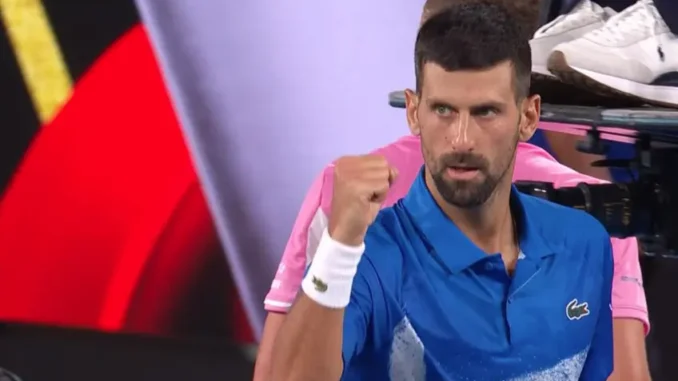
Novak Djokovic continues to redefine greatness in the world of tennis, cementing his place in the pantheon of the sport’s legends. The Serbian superstar recently reached yet another milestone in his illustrious career: securing 150 Major wins after the age of 30. This unprecedented achievement underscores Djokovic’s extraordinary longevity, consistency, and determination, setting a standard that few, if any, players are likely to match in the future.
Redefining Longevity in Tennis
For many athletes, turning 30 is often seen as the twilight of their careers. In tennis, a sport that demands relentless physical and mental endurance, it’s not uncommon for players to experience a decline in performance as they age. However, Djokovic has turned this narrative on its head, not just maintaining but often improving his level of play well into his 30s. His 150 Major wins after the age of 30 highlight his ability to adapt, evolve, and dominate in an era where younger challengers constantly emerge.
Djokovic’s post-30 success is a testament to his meticulous approach to his craft. From his innovative fitness routines to his commitment to a plant-based diet and mental conditioning, every aspect of his life is tailored to optimize performance. He has embraced advancements in sports science, recovery techniques, and nutrition, ensuring he remains at the peak of his powers even as the years pass.
Consistency Across Eras
What makes Djokovic’s achievement even more remarkable is the consistency he has displayed across different phases of his career. While his younger years were defined by raw talent and determination, his 30s have showcased a more refined and cerebral version of his game. He has become a master of adaptability, capable of adjusting his tactics to outwit a variety of opponents and styles.
Throughout his career, Djokovic has faced some of the greatest players in history, including Roger Federer and Rafael Nadal, as well as a new generation of rising stars like Carlos Alcaraz and Jannik Sinner. His ability to compete—and often dominate—against opponents of all ages and playing styles speaks to his unparalleled versatility and mental toughness. The fact that he has amassed 150 Major wins after 30, while continuing to add to his Grand Slam tally, is a reflection of his relentless pursuit of excellence.
Breaking Records and Setting Milestones
Djokovic’s journey to 150 Major wins post-30 is peppered with iconic moments and record-breaking performances. From his thrilling five-set victories to his clinical dismantling of top opponents in finals, he has repeatedly demonstrated why he is regarded as one of the greatest players of all time. His dominance extends across all surfaces, with Major wins on hard courts, clay, and grass, showcasing his all-around ability.
One of the most significant aspects of Djokovic’s post-30 success is his performance in Grand Slam finals. His composure under pressure and ability to rise to the occasion have resulted in multiple Grand Slam titles in his 30s, allowing him to surpass the benchmarks set by his contemporaries and predecessors. Each victory further solidifies his status as a player who thrives on the biggest stages, regardless of the stakes or the opponent.
The Mental Game: A Key to Success
While Djokovic’s physical abilities are extraordinary, it is his mental strength that truly sets him apart. Tennis is as much a psychological battle as it is a physical one, and Djokovic has consistently demonstrated his capacity to remain composed under immense pressure. His ability to save match points, come back from two sets down, and maintain focus in marathon matches has become the stuff of legend.
This mental fortitude has been particularly evident in his 30s, where he has faced not only younger, hungry opponents but also the weight of expectations and the inevitable wear and tear of a long career. Djokovic’s mindfulness practices, including meditation and visualization techniques, have played a crucial role in helping him maintain his edge, allowing him to stay present and execute his game plan in high-stakes situations.
Inspiring the Next Generation
Djokovic’s accomplishments post-30 serve as an inspiration to aspiring athletes around the world. His ability to defy age-related limitations and continue competing at the highest level challenges conventional notions of athletic longevity. For younger players, Djokovic’s journey is a reminder that success in tennis—or any sport—requires not just talent but also a commitment to continuous improvement and a willingness to adapt.
Beyond his on-court achievements, Djokovic’s influence extends to his off-court endeavors. Through his foundation and various philanthropic efforts, he has worked to promote education and opportunities for underprivileged children. His commitment to giving back and using his platform for good further cements his legacy as a role model and ambassador for the sport.
Looking Ahead
As Djokovic continues to compete, the question on everyone’s mind is: How far can he go? With his relentless drive and seemingly ageless performance, there’s no telling where his limits lie. Having already broken numerous records, including the all-time Grand Slam tally and weeks as world No. 1, Djokovic shows no signs of slowing down.
The 150 Major wins post-30 milestone is not just a statistic; it’s a symbol of his ability to evolve, persevere, and excel in one of the most demanding sports. As the tennis world looks to the future, Djokovic’s achievements will undoubtedly serve as a benchmark for greatness, inspiring players and fans alike for generations to come.
A Legacy of Greatness
In a career filled with extraordinary accomplishments, Novak Djokovic’s 150 Major wins after the age of 30 stand out as a defining chapter in his legacy. It is a feat that encapsulates his resilience, adaptability, and unyielding determination to be the best. As he continues to push the boundaries of what is possible in tennis, Djokovic reaffirms his place among the all-time greats, leaving an indelible mark on the sport he loves.
Leave a Reply